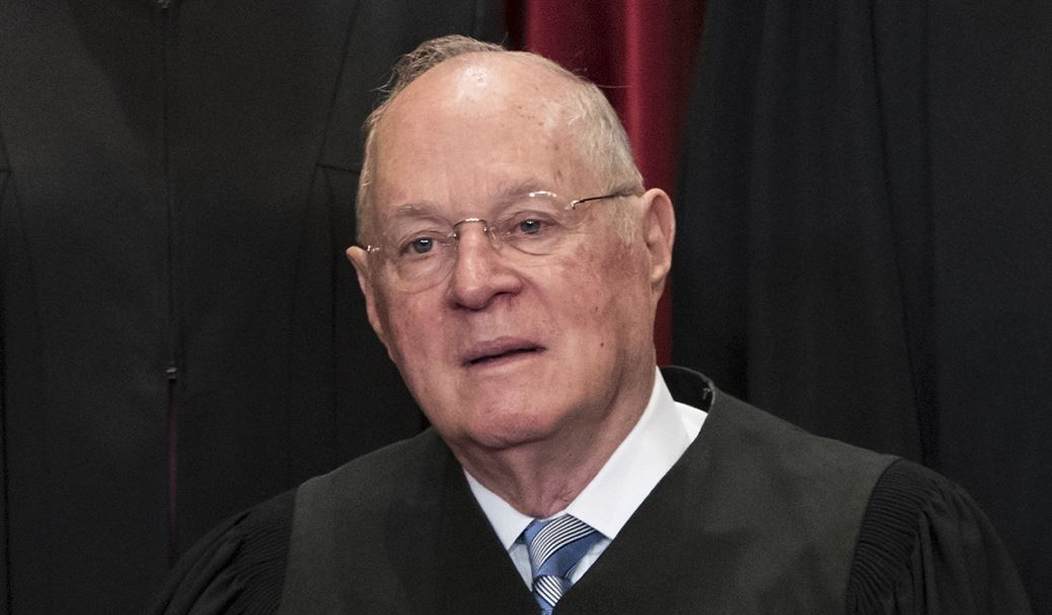How dare an 81-year-old man retire from the Supreme Court. How dare he.
That, in a nutshell, seems to be the widespread reaction among many liberals to the announcement that Supreme Court Justice Anthony Kennedy will step down from the bench next month.
"Anthony Kennedy Just Destroyed His Legacy as a Gay Rights Hero," announced a headline at Slate. Twitter, that great Hieronymus Bosch painting of our collective id, was aflame in what can only be described as full-on liberal panic. "The future of our democracy is at stake," proclaimed House Minority Leader Nancy Pelosi.
This gnashing of teeth and rending of cloth is a symptom of the dysfunction and corruption of the constitutional order. The reason Kennedy's retirement matters so much is that he was the swing vote -- the justice who could bequeath victory or defeat to the liberal or conservative bloc in any important case that divided the court.
And the reason the swing vote matters so much is that we've made the Supreme Court far too important in our lives. By being the deciding vote on so many issues, Kennedy in effect became the court itself, making him the de facto incarnation of the judicial branch, the way the president is the physical personification of the executive branch. This became all the more problematic because Kennedy's philosophy of judicial review all too often took the form of a deep personal inventory of his feelings rather than of the Constitution's text.
Recommended
Thus, Kennedy's decision not to live forever -- or at least until a Democratic appointee could replace the Reagan-appointed justice -- was seen as a personal betrayal, because the political has become so personal for so many.
"I never thought I'd say this, but you're only 81!" late-night comedian Stephen Colbert exclaimed. "You know what they say: They say 81 is the new 79! And don't tell me your mind's going, because I've read Bush v. Gore and Citizens United; you never had one!"
A Comedy Central writer tweeted (and later deleted) that he wished "this Kennedy had been shot instead of the other ones." To think such things, never mind to state them publicly, can be seen as a symptom of deranged mental health, but also of a deformed civic health.
How did we get here? There are two tracks that converged to deliver us this dysfunction. The first is narrowly political. The Democrats, confident that they were on the right side of history, thought there was no harm in accelerating the rush to total victory. For years, Democrats practiced the rule that all is fair in judicial confirmation battles, starting with the war on Judge Robert Bork in 1987. Then, under the leadership of Barack Obama and then-Senate Majority Leader Harry Reid, they did away with the filibuster on judicial appointments short of the Supreme Court, opening the door for Republicans to nudge it slightly more wide open.
The second track is longer. Starting over a century ago, progressives began emphasizing ends over means. If the Supreme Court could deliver wins unattainable at the ballot box and unsupported by the Constitution, so be it. Thus was born the "living Constitution" -- the doctrine which holds that the magical parchment should mean whatever progressives need it to mean at any moment. This was how Anthony Kennedy became (an apparently temporary) gay-rights hero. After consulting his feelings, he found a Constitutional right no one had found in the text before.
This idea that the Supreme Court is there to serve as a Praetorian Guard around progressive policies was on full display this week. Prior to Kennedy's retirement announcement, the court issued a 5-4 ruling in Janus v. AFSCME which held that public-sector unions can't compel nonunion members to pay fees for union representation, thus violating the First Amendment.
Justice Elena Kagan caustically disagreed. For her, the problem with the decision was that, "Public employee unions will lose a secure source of financial support."
"The First Amendment was meant for better things," Kagan concluded in her dissent. "It was meant not to undermine but to protect democratic governance -- including over the role of public-sector unions."
In short: The Supreme Court isn't there to protect the meaning of the First Amendment; the Supreme Court is there is protect a secure source of financial support for public-sector unions. If the First Amendment gets in the way, that's OK.
The panic unfolding across the progressive landscape stems from the creeping fear that the Supreme Court might start doing its job -- and not the job progressives have assigned it.

























Join the conversation as a VIP Member